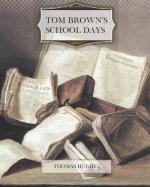All three are watching the game eagerly, and joining in the cheering which follows every good hit. It is pleasing to see the easy, friendly footing which the pupils are on with their master, perfectly respectful, yet with no reserve and nothing forced in their intercourse. Tom has clearly abandoned the old theory of “natural enemies” in this case at any rate.
But it is time to listen to what they are saying, and see what we can gather out of it.
“I don’t object to your theory,” says the master, “and I allow you have made a fair case for yourself. But now, in such books as Aristophanes, for instance, you’ve been reading a play this half with the Doctor, haven’t you?”
“Yes, the Knights,” answered Tom.
“Well, I’m sure you would have enjoyed the wonderful humour of it twice as much if you had taken more pains with your scholarship.”
“Well, sir, I don’t believe any boy in the form enjoyed the sets-to between Cleon and the Sausage-seller more than I did—eh, Arthur?” said Tom, giving him a stir with his foot.
“Yes, I must say he did,” said Arthur. “I think, sir, you’ve hit upon the wrong book there.”
“Not a bit of it,” said the master. “Why, in those very passages of arms, how can you thoroughly appreciate them unless you are master of the weapons? and the weapons are the language, which you, Brown, have never half worked at; and so, as I say, you must have lost all the delicate shades of meaning which make the best part of the fun.”
“Oh, well played! bravo, Johnson!” shouted Arthur, dropping his bat and clapping furiously, and Tom joined in with a “Bravo, Johnson!” which might have been heard at the chapel.
“Eh! what was it? I didn’t see,” inquired the master. “They only got one run, I thought?”
“No, but such a ball, three-quarters length, and coming straight for his leg bail. Nothing but that turn of the wrist could have saved him, and he drew it away to leg for a safe one.—Bravo, Johnson!”
“How well they are bowling, though,” said Arthur; “they don’t mean to be beat, I can see.”
“There now,” struck in the master; “you see that’s just what I have been preaching this half-hour. The delicate play is the true thing. I don’t understand cricket, so I don’t enjoy those fine draws which you tell me are the best play, though when you or Raggles hit a ball hard away for six I am as delighted as any one. Don’t you see the analogy?”
“Yes, sir,” answered Tom, looking up roguishly, “I see; only the question remains whether I should have got most good by understanding Greek particles or cricket thoroughly. I’m such a thick, I never should have had time for both.”
“I see you are an incorrigible,” said the master, with a chuckle; “but I refute you by an example. Arthur there has taken in Greek and cricket too.”
“Yes, but no thanks to him; Greek came natural to him. Why, when he first came I remember he used to read Herodotus for pleasure as I did Don Quixote, and couldn’t have made a false concord if he’d tried ever so hard; and then I looked after his cricket.”




